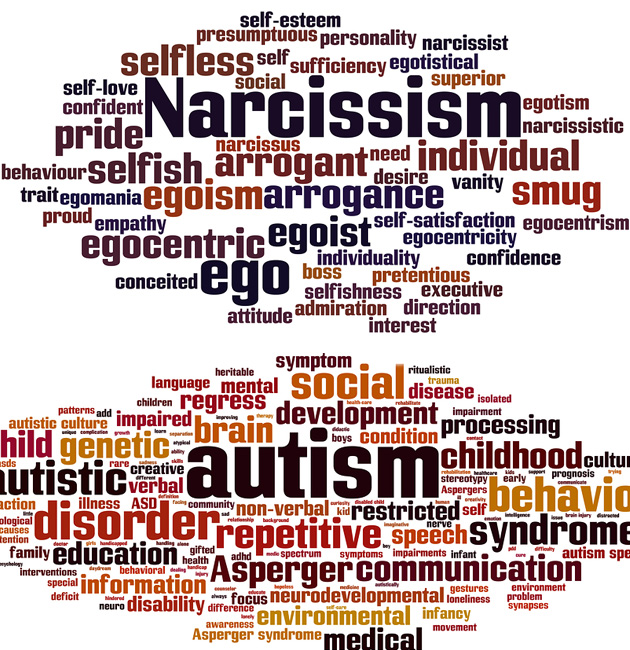 Whether or not it is noticed or understood, it would be hard to find an individual who has not been stung by an encounter with someone who suffers from either NPD or ASD.
Whether or not it is noticed or understood, it would be hard to find an individual who has not been stung by an encounter with someone who suffers from either NPD or ASD.
A result of such a rendezvous would be the feeling that one was unworthy, invisible and, somehow, “less than “.This is exacerbated by the unexpected nature of the insult received. It would be safe, under these circumstances, to guess that one has been in contact with someone who is detached from the feelings that would be expected under normal circumstances.
It can be problematic to discern if one was slighted intentionally or accidentally. The issue of volition is what necessitates the effort to understand the difference between NPD and ASD. A narcissist is well aware of the offense that has been delivered. Someone on the autism spectrum doesn’t have a clue.
Someone with ASD may appear to be normal and may excel in certain of life’s tasks. What they lack is an understanding of anyone else’s emotions. As an example, if someone with ASD parented a child, he/she would not be able to figure out that when a baby cries it is in need. This ASD parent would believe that the child is crying just for the sake of crying.
An individual on the Spectrum suffers from what is called “mindblindness”. This is the inability to empathize. He/she does not understand that others do not see the world through his/her( the person on the Spectrum’s )own particular lens. So, when the baby is crying and the ASD parent feels well-fed and comfortable it is beyond the parent’s capacity to get it that the baby may be cold or hungry.
The narcissist understands the sensitivities of others all too well. The narcissist is a master manipulator who does not care when his/her actions are hurtful. In fact, the narcissist can, intentionally, be a dangerous enemy. Beneath the arrogance that is displayed when no one “important” is around, is an ego that has been depleted of feelings of safety and self-regard.
When it comes to intimate relationships the narcissist can launch an attack that is especially hurtful. The reason for this is that the narcissist is so vulnerable to feelings of shame that he/she may, literally, wish to destroy the person who tapped into that shame.
The individual with NPD uses his/her understanding of human nature (which, of course, is cynical) to curry favor on one side of the equation and to insult and depersonalize on the other. This person is a skilled seducer who becomes furious when his/her efforts fail to produce the desired outcome. Whoever becomes intimately involved with someone with NPD is certain to be bruised. Love and interest will be offered and withdrawn as the NPD strives to enhance his/her own life. There is no genuine concern for the welfare of others.
While the NPD uses his/her expertise deliberately, the ASP has no comprehension as to why others behave the way they do. While the ASP may appear to be arrogant and rude, he/she lacks any sense of self-awareness and cannot grasp the meaning of behaviors that he/she encounters every day.
What makes social interaction particularly difficult for the ASD is that he/she doesn’t know what he/she doesn’t know. Remember, an individual on the spectrum has no idea that another has a mind of his/her own. The ASD does not wish to inflict harm. It is helpful when offended by someone on the Spectrum, to remember that the intent was not to misuse. Rather, mindblindness kicked in and the individual with ASD has no idea that he/she may have left behind hurt feelings.
For someone on the Spectrum, friendships are about shared interests not about emotional connection. Emotions are inexplicable to the ASD individual. The vocabulary is extremely limited and very basic. For many, their interests are confined to a particular subject and are intense. The ASD will happily perseverate on a topic of interest.
Another aspect of spending time with someone on the Spectrum is that he/she has no understanding of symbolism and metaphor. It has been reported that a mother told her child, who was on the Spectrum, that she did not believe what he was telling her. She illustrated this by saying, “You can tell me this until the cows come home and I still won’t believe you.” Her son’s reply: “ I don’t care about cows”.
An individual on the Spectrum cannot draw inferences or make predictions about the outcome. Therefore, this individual may be quite unprepared for the negative feedback or consequences of his/her behavior.
While there have been many theories as to the cause of ASD, the answer remains elusive. Some have theorized that children on the Spectrum have at least one parent who has NPD. There is no evidence that supports this premise.
There is evidence, however that the offspring of those with either NPD or ASD bear a number of traits in common. Because these children have been raised by parents who are incapable of empathy, they often grow up believing that they are inherently damaged and that, somehow, it is their own fault. There is a term for those who hold these damaging and intractable beliefs: Ongoing Traumatic Relationship Syndrome — OTRS. The lack of parental validation can cut deeply into a youngster’s soul and may prove to be incurable even with ongoing psychotherapy. The child of a parent on the Syndrome is frequently ashamed of the parent, which reinforces the child’s personal shame.
The person with ASD is frequently a victim. The individual with NPD is likely to be a victimizer. It is fortunate when there is a so-called “normal” individual who can look out for the welfare of the person on the Spectrum. Those with ASD are sitting ducks for exploitation.
The narcissist does not care about the damage left behind. The person on the Spectrum does not understand that the damage has occurred. An important piece of knowledge to hold on to when one encounters a personal interaction that is breathtakingly obnoxious. It is wise to protect oneself from the narcissist. It is equally judicious, as well as kind, to allow an individual on the Spectrum some latitude. Intent makes all the difference
Asperger's vs Narcissism. (n.d.). Retrieved July 18, 2017, from refulgentcoleman.blogspot.com Heitler, S., Ph.D. (2014, June 11). Do You Think of Narcissism as an Autism Spectrum
Heitler, S., Ph.D. (2014, June 11). Do You Think of Narcissism as an Autism Spectrum Disorder? Retrieved July 11, 2017, from psychology today.com
Koenraadt, M. (2016, May 18). Raised By Emotionally Immature Parents. Retrieved July 11, 2017, from koenraddt.info
Marshack, K. (16, January 18). Narcissistic Personality Disorder and Asperger Syndrome -- Can You Tell The Difference? Retrieved July 11, 2017, from kmarshack.com
Rodman, S. (2016, August 28). Aspberger's: When Narcissism Just Doesn't Explain Your Partner's Inability to Empathize. Retrieved July 11, 2017, from drpsychmom.com
About the Author

Ruth Gordon
, MA/MSW/LCSWI bring with me +30 years of experience as a clinician. My Masters degrees are from: Assumption College, Worcester, MA, Master of Arts in Psychology & Counseling/ and Boston University School of Social Work, Boston, MA, an MSW in Clinical Social Work. This is the 11th year I have written a monthly newsletter that is sent to approximately 500 individuals. The archive can be found on my website, www.foreverfabulousyou.com.
Office Location:
The OC Building, 11983 Tamiami Trail, N., Naples, FL 34110
Naples, Florida
34110
United States
Phone: 239 293-4314
Contact Ruth Gordon
Professional Website:
www.foreverfabulousyou.com